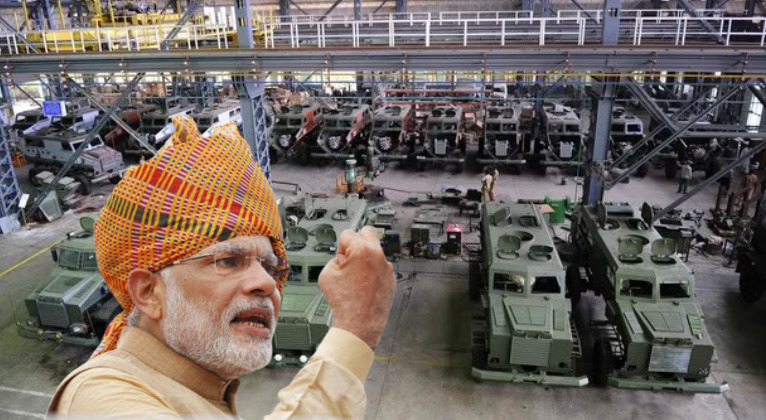Prime Minister Narendra Modi has time and again proved his extraordinary vision and foresight. When he launched plans for the indigenisation of India’s defence sector, it seemed like a plan to make India self-sufficient in military equipment.
But as it turns out, PM Modi’s Make in India initiative in the defence sector is also bringing the country out of an era of allegations of political kickbacks and bureaucratic red tape.
Read more: In a big step forward, India will soon be Aatmanirbhar in the manufacture of 90% of Defence products
PM Modi’s big defence indigenisation push
During his inaugural address at a defence ministry seminar on Atmanirbhar Bharat in Defence – Call to Action, PM Modi made a big push for self-reliance in the defence sector.
He said that customisation and uniqueness were key to maintaining a surprise element against the adversary. The Prime Minister added that it could only be achieved if weapons and systems are developed in the country.
PM Modi explained, “If 10 countries have defence equipment of the same type, then your armed forces will have no uniqueness. For uniqueness and surprise element, military equipment has to be developed in our own country.”
As per PM Modi, India will soon notify a new list of weapons and systems that cannot be imported. This will be the third such list for the purpose of promoting the indigenisation of India’s defence industry.
209 weapons and systems including artillery guns, missile destroyers, ship-borne cruise missiles, light combat aircraft, light transport aircraft, long-range land-attack cruise missiles, basic trainer aircraft, multi-barrel rocket launchers, assault rifles, sniper rifles, mini-UAVs, specified types of helicopters, next-generation corvettes, airborne early warning and control (AEW&C) systems, tank engines and medium-range surface to air missile systems have been already listed by India for its indigenisation efforts.
India has been looking to promote its ‘Make in India’ initiative in the defence sector. As a part of the initiative, it is looking to localise the production of key arms and weapon systems.
Indigenisation to root out corruption
PM Modi pointed out that indigenisation is not only going to strengthen the defence industry but is also going to help India combat corruption in defence deals.
Read more: Here is how India can turn into an arms manufacturing powerhouse
The Prime Minister said that in earlier times, controversies and allegations of kickbacks were linked to imported weapons. There is a high degree of competition amongst leading global defence firms which leads to intense lobbying in military deals and leaves out scope for corruption and kickbacks.
PM Modi said, “This created confusion, doubts and even opened doors for corruption. A lot of confusion was created over which weapon is good, which is not…which is useful and which is not. Aatmanirbhar Bharat is the solution to this problem too.”
History of controversies in defence deals
PM Modi is right. India has a history of corruption allegations in defence deals. It dates way back to 1948, when VK Krishna Menon, then India’s high commissioner to Britain, signed a deal with a Britain-based firm for the supply of jeeps at a cost of ₹80 lakh. Out of the promised 1,500 jeeps, only 155 were delivered. The case was closed later in 1955.
Then, in the 1980s, there were two big cases- one of them was related to an agreement to buy 55,000 CZ95 pistols. The Czech handguns were priced ₹3,438 per piece. But the deal didn’t go through as allegations of irregularities surfaced and a loss of ₹25 lakh was caused to the exchequer due to contractual obligations.
The other case was, of course, related to a $1.4-billion howitzer deal between Swedish arms manufacturer Bofors and the Indian government. This scam snowballed into a major political controversy and is also seen as the reason behind then Prime Minister Rajiv Gandhi’s electoral defeat in 1989.
And this is just the tip of the iceberg. There have been many more such controversies over the last seven decades.
However, with PM Modi’s indigenisation agenda, India is eliminating the expansive role of foreign arms manufacturers in its defence industry. This could actually mean an end in the era of kickbacks, bribery and rampant corruption in big-ticket defence deals.
